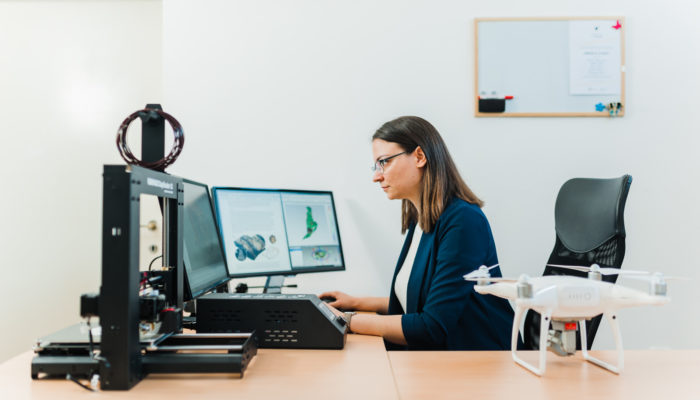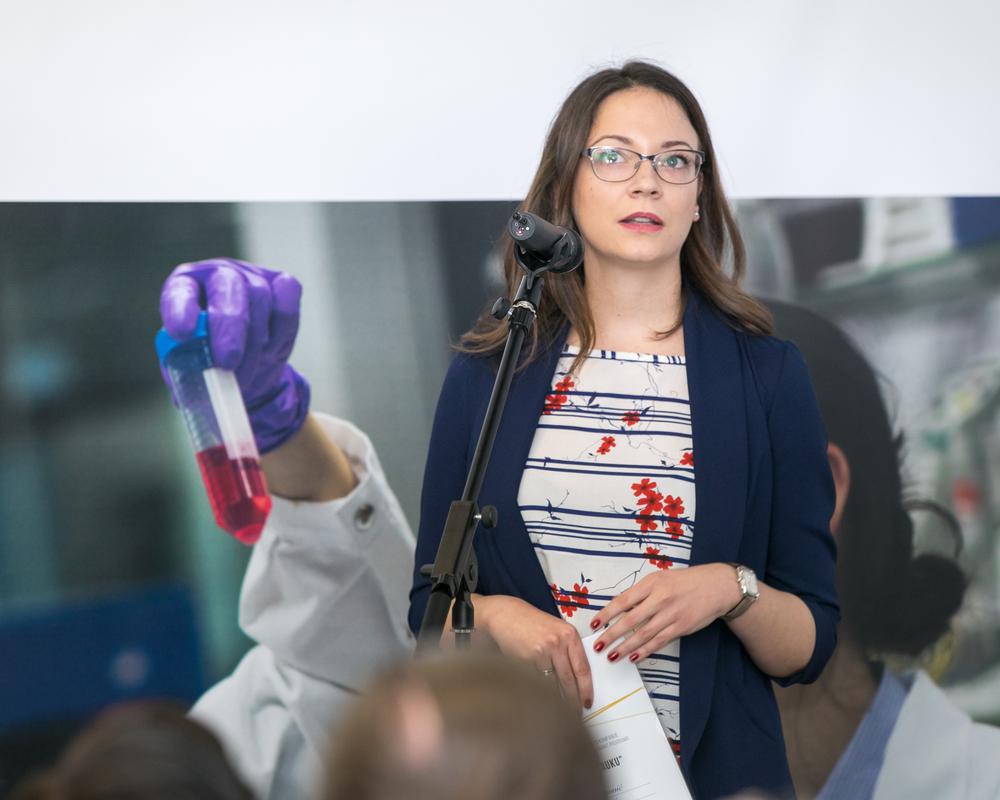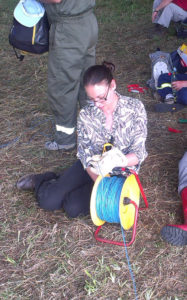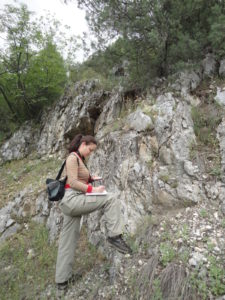
Hello Dragana, what is your story?
My name is Dragana Đurić and I am a Ph.D. in Geophysics and Assistant professor at the University of Belgrade, Faculty of Mining and Geology, Department of Geophysics.
My journey within the geophysics started in 2004 when I enrolled in my undergraduate studies. To be honest, geophysics wasn’t my first choice, but after I had finished the first year, I had completely fallen in love with it and I was sure that it was going to be my career for life.
After I finished the undergraduate studies, I started a Ph.D. which I completed in 2015. Since then, and even before getting my PhD, I started to develop my research skills and encouraged myself to become a young geoscientist.
Now I am the youngest Assistant professor at my Department. I am teaching several courses, one of them is “Basics of Geophysics”, where I have a very nice opportunity to teach geophysics to non-geophysicist students and present it in the light that it deserves.
Another course, taken by master students in geophysics, is the “Processing and interpretation of seismic signals”. This course gives broadness to both, me and the students, and requires their extensive engagement knowledge. Besides these two, I would like to mention the “Field Practice in Geophysics”, which brings together all their knowledge and skills acquired during their studies.
Why Geophysics?
I love the possibilities geophysics gives to researchers. Geophysicists use a broad spectrum of methods to study some of the most interesting occurrences, processes, and hazards or to solve specific geological and engineering-geological problems. I am not sure that any other discipline in geology has such a range of possibilities and challenges. Or I’m biased regarding this, which is quite possible.
Anyway, the area of my interest could be described primarily as the application of geophysics to solve geodynamical issues, as well as natural hazard phenomena.
My Ph.D. thesis was focused on the spatial position of ophiolites within a very specific geotectonic unit in the Balkan Peninsula (East Vardar zone). By solving the model (using the geophysical and other geological data), answers to the geodynamic evolution of the whole of that part of the Balkan Peninsula is offered, indicating the specific scenario that involves a distinctively different emplacement mechanism for the western and eastern Tethyan ophiolites.
By following the situation and the data availability, I have been very oriented towards using remote sensing data, since my undergraduate studies. Today, I am increasingly using this type of data and improving my knowledge and skills in this direction. Of course, all this data is combined with other geophysical data.
I am particularly interested in data and results, in the context of natural hazards and disaster risk management, such as earthquakes, volcanoes, landslides, floods, etc. This data is usually freely available as well as software, which is a great advantage.
I strongly believe that the future lies in open data and cloud processing platforms, as well as the availability of both, data and results.
A long, steep road to gender equality in Science in Balkan regions
During the preparation for the interview, I have read several studies on the issue of gender equality in science. These surveys (at least the ones I came across) did not cover the Balkan countries and covered a small number (if any) of Eastern European countries. This is not a surprising fact. To make things clear, in Serbia (and, generally, in Balkan countries) it is hard to deal with science, regardless of gender.
Funds for scientific research from the state budget are below every average in Europe (cca. 0.37% of total GDP for 2018 [1]), and the state’s interest in science is at the same level. I give myself the freedom to say that scientists are, in general, the discriminated category in the country. For example, in a two-hour race, scientists from Serbia are late at the start by an hour, compared to colleagues from Western Europe.
The situation in higher education is also far away from the ideal. For starters, interest in high education is very low, less than 10% of people have a faculty degree. The second problem, on the other level, is the selection of candidates at faculties, institutes, etc., but this is not a topic this time. Now, imagine that in such, generally difficult conditions for science, you are a female in natural/technical sciences. Your start position is even worse. You have to prove that you are capable of that race at all.
What about your Faculty?
If we make a screenshot of my Faculty, or wider, at my University, there can be taken the wrong conclusion that gender inequality is no longer an issue that should be addressed. Why? The Head of the Department of geophysics is a female. The Chief of the geological section is female. For two positions of Vice-dean, females were elected. The student Vice-dean is a female. Rector of the University of Belgrade is a female as the president of the Serbian geological society as well… If we take a look at this list, it seems that there is no gender inequality within science, at least within geoscience.
However, if we scratch just below the surface, do some research and look at other, not so obvious, data, it is clear that the situation is far from ideal. The list of women, currently in leadership positions may seem to be improving the situation on gender equality. Perhaps that is the case (which I doubt), but that conclusion cannot be made only based on one mandate.
At my Faculty, since its founding in 1946, a woman has never been the Dean. Also, only six women have held leadership positions (two currently, and all in the last ten years). There are 33% of female professors and only 27% of the Full Professor position [2]. Also, if we analyze the repository of peer-reviewed papers published by faculty staff, out of the first 25 authors (by many published papers), there are only five women. The female first author is in about 33% of all peer-reviewed papers in respectable journals published by faculty staff [3].
In the history of Serbian geological society, 129 years long, only two women were Presidents. The same situation is at University, wherefrom its establishment in 1903, only two female Rectors were elected. The Department of Mathematics, Physics, and Geosciences – SASA (Serbian Academy of Sciences and Arts) has 36 members including foreign members and none female members.
Where could the problem lie?
The main problem is that we have a lower interest of female students for all technical and natural sciences, including Earth sciences. At the Faculty of Mining and Geology, University of Belgrade, there are 35% (rough estimation based on available data) of female students at all levels of studies, while at the Ph.D. studies there are 45% of female students. By analyzing the data about the individual duration of the Ph.D. study, it can be concluded that between Ph.D. students that study longer than 6 years is about 60% of female students.
Generally, the problem in geology in terms of gender equality, especially within people from the industry where this branch is often seen as male, and are therefore transferred to science. It is necessary to stimulate young women to study natural and technical sciences first, and then to stimulate them to pursue science, to encourage them with our example, give them advice and guidance. The involvement of industry in this matter is also very important. Despite previous, there are some bright examples within companies that operate in Serbia.

Receiving a grant on behalf of the project team, 2017 (photo credit: Start Up For Science Foundation)
Women often face sexist micro-aggressions in the workplace, many of which are a result of subconscious biases that people don’t even realize they have. Knowing how to respond to gender bias in the workplace is a touchy subject. Still, it is essential for workers.
Have you ever experienced or witnessed gender bias in the workplace? How did you deal with it? Do you still experience gender bias in spite of your accomplished career?
I had no such problems. I know that some other female colleagues did, mostly in the form of micro-aggressions, comments on looks, family, love relationships, etc. I do not know how they struggled with these things, but I think it’s really important that women are able to rise above such comments and to oppose. I’m not talking about sexual harassment that encompasses many actions, some of which (though not all) violate criminal statutes. I am primarily talking about sexist jokes or gossip. However, I was lucky that I had the opportunity to choose people to work with during my PhD studies and now, and those choices have been good so far. Regarding this, my work environment advocates gender equality, among other things.
It seems to me, and what affects me and other female colleagues is, that there is less recognition for achievements and efforts of female scientists than male colleagues (in all spheres, teaching, writing scientific papers, projects etc). It is often assumed that in a mixed team, a male colleague is the one who is responsible and who has the main idea or initiative. These are commented on in various ways, but mostly all aim to downplay the importance of female participants. I would like to point out that there are usually no such comments within the research group itself, because such a group knows exactly who is doing what, but such comments are perceptible by external observers, regardless of gender (ironically?). This I would emphases as a kind of gender bias, perhaps the most visible.
It turns out that female scientists need more commitment to gain recognition. Or this is the subject for discussion? However, the fact is that in Earth Sciences there are fewer female students, scientists, and between those who succeeded, less principal investigators, first authors, etc.
We lightly assume that sexism and gender bias come only (or, mostly) from men. Yet, experimental evidence exists that science faculty of both genders exhibit bias against female undergraduates [4].
What are the strategies you try to apply in your everyday life to reduce your own gender bias?
I grew up in a family where we have always learned that there is no difference between genders, races or nations. So I have been living with that attitude from the very beginning, which I think is very important. Professionally, I value people for what they do and on the basis of results and commitment. Especially in science, I do not see what gender would be important for achieving results, the quality of scientific research work (?) Which criterion fulfills one gender in relation to the other, and which is relevant for scientific results?
My experience of gender bias, in terms of work of my male colleagues, is more respected and valued, I feel that the only thing I can do is continue to work and strive and that the results will one day be those that speak for me. This is not an ideal situation, but I do know many women, who have risen above the gender benchmark with their achievements.
Where females are discriminated by both, men and women, is maternity leave. With all the understanding that should exist and exist in most cases, there is the fact that during this period a female scientist (as any other woman) cannot dedicate herself to her work. Then, as a rule, they are excluded from ongoing projects or planned projects/papers/committees/etc, regardless of the plans of the female scientist herself. Legally speaking, the situation is better, because it is a period in which the professional status and job position are at a standstill. These are just some of the examples that I can think of right now, and I’m sure there are more.
In many ways, society today is turning away from gender bias and sexism more than at any other time in history. Yet gender gaps and inequalities persist.
Why are things not changing faster in your opinion?
There is a legit question: ”Do men and women need to do the same work to be equal, or does work done by men and women need to be equally valued?” [5]. I think that the second one is fair.
As I said at the beginning of this interview, it seems that things are changing. The question “why are things not changing faster” is hard to answer, because we need to find out first what is the main reason for gender bias. Maybe, if society gives the same condition/start position to every scientist regardless of gender, race or nationality, it will start to change the system.
In Earth sciences, we need to tear down prejudices that it is a male call. This is partially done, but there is more work on it. However, here in Serbia, first, it is necessary to improve overall conditions in science, together with the improvement of female scientist position and recognition. This is interconnected and inseparable.
I don’t want to be too critical, so I would like to bring to mind that currently, we have female scientists, professors at the leading position. I am just not sure if this becomes the tradition or its just occurrence as well as if this is enough to say that gender gaps do not exist. Also, I advocate complete gender equality, without positive discrimination of female (or male).
Research shows [6] that women’s motivation, participation and even perceived interest in STEM is enhanced by having other women in their working groups.
If you were to name a person who inspired you during your career, who would (s)he be? What would you do to help inspire the next generation of female scientists?
This is indeed true. I didn’t mention that at the beginning, but my decision to stay in geology, after the first year of study, and also to opt for geophysics was largely influenced by female professors and assistants, whom I want to thank on this occasion. With their engagement, they conveyed the love for geology to me, and in particular cast aside the slightest doubt as to whether I, as a woman, had a place here in the so-called “male” profession. Besides, our senior female colleagues, students of geophysics, also gave us (younger students), full support. They were all pretty good students, and now they are successful scientists, researchers, engineers. Even today, we support each other and promote each other.
My mentor, Dr. Vladica Cvetkovic, is certainly the person the most responsible for my professional carrier and scientific improvement. He was the person who asked “What do you want to do for your Ph.D.? What is a challenge for you? Why? How do you mean to fulfill (work plan/research project)?”, and then helped me to realize that. Also, he was always supportive and wanted to help when I was writing projects, proposals, etc. He was there to revise, to give his suggestions and comments and to convey what he does best.
I think this is the right way to inspire young people, to ask them the right questions at the right time and to do everything we can to help them achieve it, and afterward, throughout their careers, support them.
We can inspire the next generation by our example and by other positive examples, which need to be widely promoted. Also, we are all learning continuously and the experience is what we will be able to pass on to the next generation, so we must support each other from the very beginning.
⇒ Go back to the Blog series
_________________________________________________
References:
[1] https://data.stat.gov.rs/Home/Result/100109?languageCode=sr-Latn
[2] http://rgf.bg.ac.rs/eng/page.php?page=osoblje
[3] http://dr.rgf.bg.ac.rs/s/repo/indeks?q=&limit%5Brgf_identifierCategory_t%5D%5B0%5D=m20
[4] doi: 10.1073/pnas.1211286109
[5] O’Brien, K., Holmgren, M., Fitzsimmons, T., Crane, M., Maxwell, P., Head, B., 2019, What Is Gender Equality in Science? Trends in Ecology & Evolution, May 2019, Vol. 34, No. 5, pg.395-399
[6] https://doi.org/10.1073/pnas.1422822112



Teta
Ti si moja lepotica. Teta lj.